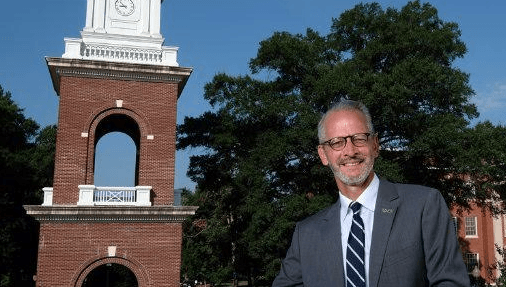Troy Paino deliberates on how to fix the issue of faculty and staff salaries
3 min read
Troy Paino | Twitter
By DEBORAH NGANGA
Throughout the past five years, according to Provost Jonathan Levin, many University of Mary Washington faculty and staff have been unhappy with their static salaries. The biggest contributing factor as to why they have not received any raises is due to the Commonwealth’s lack of support for faculty raises.
However, Levin mentioned that the Commonwealth recently brought up the topic of raises, though it was quickly shut down because its tax revenue estimates were not met.
“This year, the Commonwealth held out to prospect of an increase, only to pull it because tax revenues did not meet the projections upon which they had built the Commonwealth’s Fiscal Year 2017 budget,” Levin said.
Sophomore Emma Baumgardner feels that university presidents are under a lot of pressure to do something about the salaries of faculty and staff, especially new presidents, such as President Troy Paino, who has only held this position for 10 weeks. Some might believe that the president has a lot of say in salary decisions. However, there are plenty of factors that go into those decisions, such as, state classifications, rank, budget and market.
State classifications and rank can help to increase a candidate’s salary because the candidate has more experience and would be more knowledgeable than a candidate without the same qualifications or rank. Both budget and market can either increase or decrease a candidate’s opportunity to have a higher salary. If the university’s budget is large or the market is in a good place, that can increase the chance of a higher salary. While a small budget and bad market can decrease the chance of a higher salary.
Associate Vice President of Human Resources and Affirmative Action, Sabrina Johnson, ultimately said, “Upon selection of a final candidate for staff positions, the hiring manager, in consultation with the Human Resources office, will determine the salary offer based on several additional factors including current salary, qualifications, internal alignment and budget.”
Salary offers are then approved by the Provost, not the president. But just because our president does not have as much say in salary decisions as one would think, does not mean there is nothing that he could do about it. Paino knew that he would have to learn about the challenges and opportunities facing Mary Washington, and he knew that faculty and staff salaries would be one of those challenges.
When Paino was asked about what plans for faculty and staff salaries he came to the university with and if those plans have changed in the short time he has been here, he said, “It is impossible to develop a plan to address it without knowing the facts and the context in which you will be operating.”
So, one of his first year priorities as president, “is to develop and begin implementing a plan in regard to faculty and staff salaries.”
When asked about how he hopes President Paino can better the situation of stagnant facultyand staff salaries, Blake Showers, a sophomore majoring in Economics, said, “Depending on their performance, faculty and staff should receive small raises every year and larger raises every five to ten years.”


